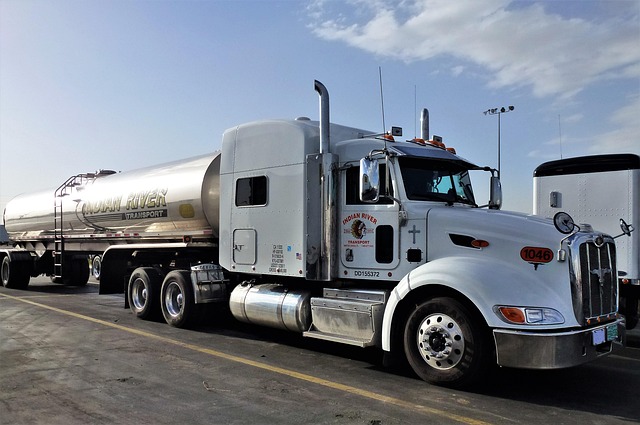Commercial Truck VIN Checks provide fleet managers with a powerful tool for ensuring vehicle safety and compliance. By accessing detailed histories including ownership, maintenance, accidents, and recall status, they can identify recurring issues, take proactive measures, and adhere to strict industry standards set by NHTSA and ISO. Advanced digital platforms and AI streamline the process, saving time and resources while enhancing data accuracy. Regular VIN checks, combined with education and a strong safety culture, are essential for maintaining high road safety standards and preventing costly recalls.
In the dynamic realm of commercial trucking, where safety and reliability are non-negotiable, a simple yet powerful tool emerges as a fleet manager’s best ally—the Commercial Truck VIN Check. This meticulous process transcends a mere vehicle identification number verification; it unfolds into a comprehensive historical account, revealing past accidents, ownership changes, and maintenance records. With recent recalls, such as General Motors’ massive defect-related action, underscoring the potential consequences of overlooked issues, the importance of proactive VIN checks becomes crystal clear. This article explores the multifaceted benefits of VIN checks, delving into their role in enhancing truck safety, preventing costly recalls, ensuring regulatory compliance, and ultimately streamlining fleet management processes.
- Understanding VIN Checks: Unlocking Vehicle History
- The Impact of Historical Data on Truck Safety
- Avoiding Costly Recalls: Proactive Measures
- Compliance and Standards: Meeting Regulations
- Efficient Fleet Management: Time and Cost Savings
- Technology in Action: Tools for VIN Checks
- Best Practices: Ensuring Continuous Safety
Understanding VIN Checks: Unlocking Vehicle History

A Commercial Truck VIN Check is more than just a number; it’s a gateway to a vehicle’s past. The unique identifier, known as the Vehicle Identification Number (VIN), holds a wealth of information crucial for fleet managers and owners. By simply entering the VIN into an approved database, one can uncover a detailed history, revealing where the truck has been, who owned it previously, and how well it has been maintained.
This process is vital in today’s world, where vehicle history plays a significant role in ensuring safety and compliance. For instance, it helps identify recalled vehicles, which, as seen in recent events, can affect entire batches of trucks. Thus, a comprehensive VIN check becomes an indispensable tool for fleet managers to make informed decisions, mitigate risks, and uphold the highest standards of road safety.
The Impact of Historical Data on Truck Safety

Historical data plays an indispensable role in enhancing truck safety, offering a window into the past performance and condition of each vehicle. By analyzing previous accidents, maintenance records, and ownership history, fleet managers can identify recurring patterns or trends that may indicate underlying issues with specific makes, models, or even individual trucks. This proactive approach allows for targeted interventions, such as recalling vehicles for inspection or implementing tailored safety protocols to mitigate known risks. Moreover, understanding the historical context enables insurers to assess risk more accurately, potentially leading to better insurance rates for fleet operators who demonstrate a commitment to safety through comprehensive data analysis.
Avoiding Costly Recalls: Proactive Measures

In the dynamic and highly regulated commercial trucking industry, avoiding costly recalls is not just a matter of adhering to legal requirements but also ensuring operational safety and efficiency. Proactive measures such as regular and comprehensive Vehicle Identification Number (VIN) checks play a pivotal role in this strategy. By scrutinizing a truck’s history, fleet managers can gain invaluable insights into potential safety hazards that might have been overlooked during initial inspections or gone unnoticed due to the vehicle’s previous ownership.
These checks reveal crucial information, such as past accidents, maintenance records, and service histories, which collectively paint a picture of a truck’s overall health. For instance, identifying previous accidents could point to structural weaknesses or recurring mechanical issues. Accessing maintenance logs can highlight patterns in service intervals, repairs, and parts replacements, offering clues about potential future problems. Armed with this data, fleet managers can take preemptive action, scheduling necessary repairs or maintenance tasks before any defects escalate, thereby avoiding costly recalls and minimizing disruptions to their operations.
Compliance and Standards: Meeting Regulations

In the commercial trucking industry, adhering to stringent safety regulations is non-negotiable. Compliance with standards set by governing bodies like the National Highway Traffic Safety Administration (NHTSA) and International Organization for Standardization (ISO) not only ensures the well-being of drivers and passengers but also maintains the integrity of a fleet’s reputation. Regular VIN checks play a pivotal role in this compliance process. By uncovering potential safety defects, such as those highlighted in General Motors’ recent recall, fleet managers can proactively address issues that could lead to violations or worse—accidents.
These checks enable managers to verify that their vehicles meet the required safety standards, including equipment specifications, accident history, and maintenance records. This proactive approach not only safeguards against legal repercussions but also fosters a culture of safety within the organization, ultimately contributing to a more reliable and efficient fleet operation.
Efficient Fleet Management: Time and Cost Savings

In today’s competitive trucking industry, efficient fleet management is not just a best practice but an imperative. A key enabler in this regard is the integration of advanced vehicle identification (VIN) check systems. By automating and streamlining the process, fleet managers can save significant time and resources that would otherwise be spent on manual verification. This not only enhances operational efficiency but also reduces the risk of human error, ensuring accurate and up-to-date records at all times.
Furthermore, timely VIN checks enable proactive decision-making. Identified issues can be addressed promptly, preventing minor problems from escalating into costly repairs or, worse, safety hazards. This proactive approach translates to substantial cost savings for businesses, allowing them to allocate resources more effectively and maintain a competitive edge in the market.
Technology in Action: Tools for VIN Checks

In today’s digital era, technology has revolutionized the way Commercial Truck VIN Checks are conducted. Gone are the days of manual paperwork and time-consuming research. Advanced online platforms and data analytics now power these checks, allowing for quick and accurate insights into a vehicle’s history. These tools integrate with various databases, including state motor vehicle records, manufacturer information, and reporting agencies, to provide a comprehensive report within minutes.
The utilization of artificial intelligence (AI) and machine learning algorithms further enhances the precision of VIN check tools. These technologies can detect patterns and anomalies in data, identifying potential issues that might be overlooked by human analysts. This level of sophistication ensures that fleet managers receive up-to-date, reliable information, enabling them to make informed decisions regarding their vehicle maintenance and replacement strategies.
Best Practices: Ensuring Continuous Safety

To ensure continuous safety within the commercial trucking sector, fleet managers must adopt best practices that incorporate regular and rigorous VIN checks as a standard operating procedure. This involves utilizing advanced digital tools designed to streamline the process, ensuring accuracy and efficiency in data retrieval. Regular intervals should be set for VIN check updates, ideally aligning with significant milestones in a vehicle’s lifecycle—such as purchase, sale, or major maintenance events. By maintaining up-to-date records, managers can quickly identify patterns or discrepancies that may indicate underlying issues.
Additionally, fostering a culture of safety awareness among drivers and staff is vital. Educating the team about the significance of accurate VIN check data and its potential impact on road safety empowers them to take ownership of the process. Regular training sessions and open communication channels can help keep everyone informed, ensuring that safety remains at the forefront of operations.
In the dynamic realm of commercial trucking, where safety is non-negotiable, a Commercial Truck VIN Check stands as a steadfast ally. By embracing this powerful tool, fleet managers can navigate the intricate web of vehicle history with confidence, proactively addressing potential hazards and ensuring compliance with stringent regulations. Ultimately, this proactive approach not only safeguards drivers and passengers but also fosters operational excellence, making it an indispensable practice in today’s safety-conscious trucking industry.



